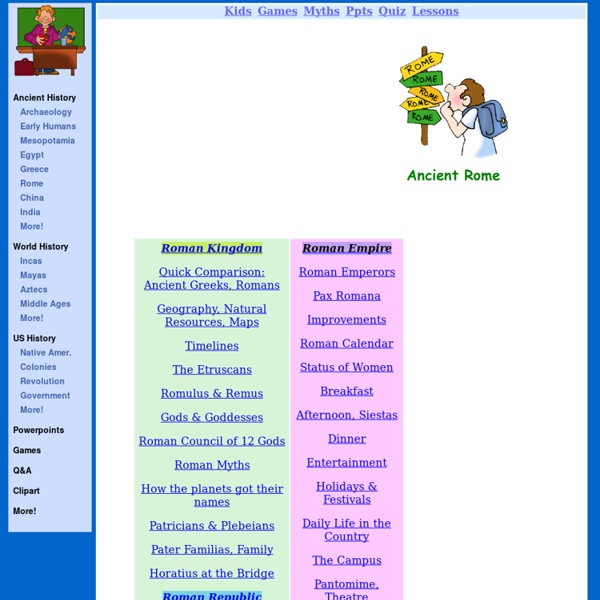



30+ Moodle Videos and Tutorials by @sbrandt (nice work!) | Moodl Stumbled across this huge repository of video screencasts on Screenr.com last week and just had to share them. Shawn Brandt (@sbrandt) created them all and out of the nearly 80 videos he’s posted about 1/2 are all about Moodle. The topics range from beginner to more advanced and most videos are under 5 minutes. Note that many appear to pertain directly to a Moodle training course that is not available publicly. But that doesn’t detract from the great ideas and processes outlined in the videos. adding events and using the calendarusing assignmentscreating pages and resourcesdisplaying directoriesusing .zip files to upload multiple filesimproving your course aestheticsand so much more. Here’s a great one (creating a course that’s more learner-centric, For the full list of videos go to this link: And don’t forget to let @sbrandt know that the videos rock!
Primary History - Romans Classical Reception Studies Network The Classical Reception Studies Network (CRSN) aims to facilitate the exchange of information and to encourage collaboration in the field of classical reception studies by bringing together departments and individuals from across the world. Classical Reception Studies is the inquiry into how and why the texts, images and material cultures of Ancient Greece and Rome have been received, adapted, refigured, used and abused in later times and often other places. For more information on the Network and its history, please go to the Network page which explains who we are and what we do. The Events section lists current and future Classical Reception conferences, seminars, workshops and performances. "Happy Birthday, everyone - and many happy returns!" "Congratulations to the Classical Reception Studies Network on the first ten years, which have done so much to make the UK an exciting centre for the study of all aspects of classical reception.
A glimpse of teenage life in ancient Rome - Ray Laurence Moodle Tutorials ::: Educating Educators Part of a wall painting from a Roman villa Roman Britain, 4th century AD Lullingstone, Kent Christians at prayer This wall painting was found at Lullingstone, Kent, in the Darenth valley, when the remains of a Roman villa were excavated in 1949. The villa had been built in the late first century AD, and altered and extended several times in the succeeding 300 years. The walls were decorated with elaborate paintings on Christian themes, which have been partially reconstructed. G. de la Bédoyère, Roman villas and the countrysi (London, Batsford/English heritage, 1993) G.W. C.
VROMA :: Home Gracchi Brothers The social and political landscape of the Roman world was about to undergo an abrupt transformation in the Late Republic. The emergence, and eventual assassination of the Gracchus brothers, Tiberius and Gaius, is often considered the first major step towards the fall of the Roman Republic. While Roman class and social affairs had for centuries consisted of machinations by various individuals to get their way (such as the Plebs withdrawal from Rome in the early Republic), the activities of the Gracchi completely altered the state of Roman politics. The careers of these two men were marked by riots, murder, and ultimately, outright manipulation of the common population to achieve their goals. The tremendous growth of the Empire, through both acquisition of land, slaves, and various citizen classes led to a fundamental divide in the Roman political system. From 137 to 121 BC, Tiberius, and then Gaius Gracchus, stood at the center of this turmoil.
Random Wikipedia subject discovery Diabetic ketoacidosis (DKA) is a potentially life-threatening complication in people with diabetes mellitus. It happens predominantly in those with type 1 diabetes, but it can occur in those with type 2 diabetes under certain circumstances. DKA results from a shortage of insulin; in response the body switches to burning fatty acids and producing acidic ketone bodies that cause most of the symptoms and complications.[1] DKA may be the first symptom of previously undiagnosed diabetes, but it may also occur in people known to have diabetes as a result of a variety of causes, such as intercurrent illness or poor compliance with insulin therapy. DKA is a medical emergency, and without treatment it can lead to death. Signs and symptoms[edit] The symptoms of an episode of diabetic ketoacidosis usually evolve over the period of about 24 hours. On physical examination there is usually clinical evidence of dehydration, such as a dry mouth and decreased skin turgor. Cause[edit] Mechanism[edit]
Catalogue - Senate House Libraries -- Warburg Institute digital copy antiquities Catalogue Articles You are not logged in | My saved items (0 items) | Login Give Feedback Explore Related Searches Advanced Search Results 1 - 25 of 30 for Warburg Institute digital copy antiquities 1 2 next Sorted by Relevance | Title | Date Refine by: Availability At the library (30) more Format Location Latin (22) Italian (9) Dutch (2) French (2) English (2) German (1) Greek, Ancient (to 1453) (1) Language Publish Date Rome (13) Italy (5) Greece (2) Etruria (1) Mainz (1) Turkey (1) Place Refine by Tag: ancient art ancient history ancient sculpture antiquities architecture art classical antiquities italy rome statues [Show more tags] Related Searches Additional Suggestions ancient art ancient history antiquities classical antiquities italy rome statues more ancient art ancient history ancient sculpture antiquities architecture art classical antiquities classical art classical art objects classical gems classical mythology diana emperors engraving engravings etruria fountains french engraving greece greek numismatics italy jacob de wilde x